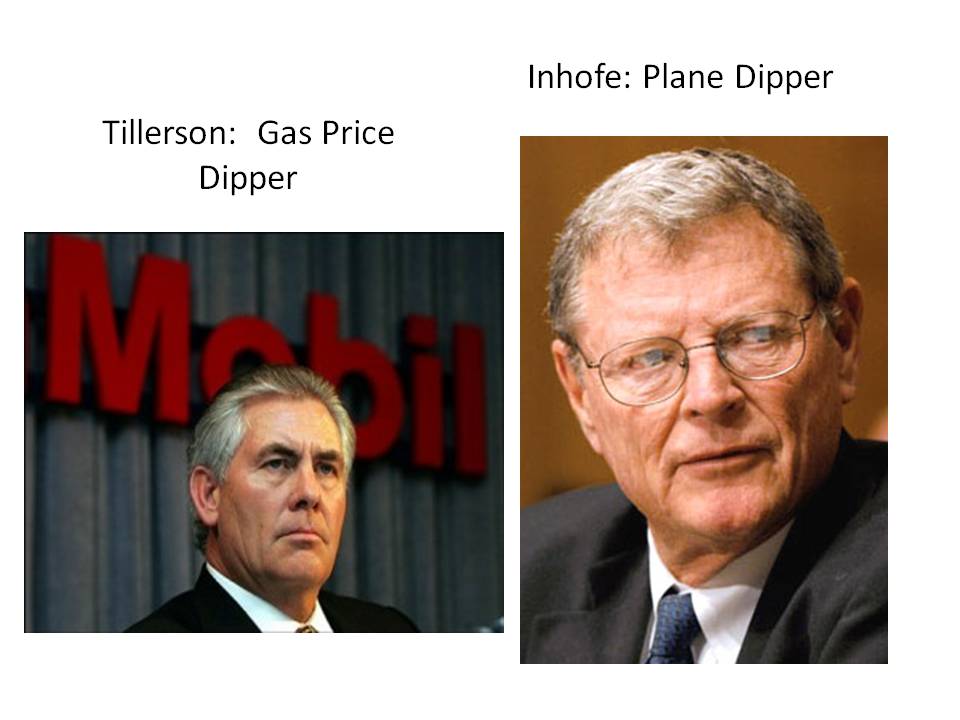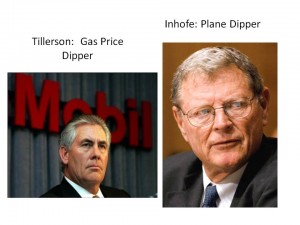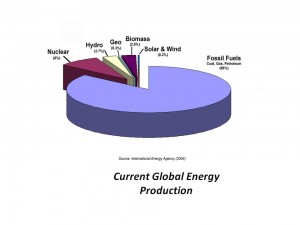By OcJim
The issue of energy policy seems to bring out the dippers, the deniers, and the dupes.
James Inhofe, the Senator from Oklahoma, is a denier of climate change and an airplane dipper who last year landed his aircraft at the closed Cameron County Airport in Port Isabel, Texas, causing work crews to run for their lives. We also have Rex Tillerson, the CEO of Exxon-Mobil, who shares Inhofe’s denial of climate change, believes in unrestrained fracking, declares that high gas prices are caused by speculation and should dip to $60-$70 a barrel, and vilifies Obama’s denial of the Keystone pipeline permit. And don’t forget $2.50 a gallon, Newt. Meanwhile, we all are the dupes.
It is quite likely that President Obama and American voters will have to bear an extreme onslaught of pressure from giant energy corporation lobbyists, as well as from both Republicans and Democrats who want to embrace new fossil fuel projects of exploration and transport. Being well-informed about the impact of fossil fuel projects can arm you against the relentless assault that will come.
If we don’t want money, power and agenda to sanction a policy that threatens our planet and leads us down paths designed for the rich, some rational thought and soul-searching must enter into the fray.
Because the specter of peak oil is assumed, estimates by the Energy Information Administration (EIA), the research arm of the Energy Department, has, as recent as a few months ago, predicted US oil and natural gas production would follow a path of steady decline, necessitating burgeoning dependence on foreign oil. In 2010, oil consumption exceeded production by over 5 million barrels per day, 82 million barrels produced and 87 million barrels consumed, this for the first year ever. Such an imbalanced state defines peak oil.
Basically it has taken less than 125 years to half-consume what has taken 50 to 300 million years to form. That totals some 1.3 trillion barrels of the world’s 2.5 trillion barrels of crude reserves.
In spite of this, President Obama recently indicated that our oil and gas production has increased, causing less dependence on foreign oil.
In essence, the world is not running out of oil itself, but rather its ability to produce high-quality cheap and economically extractable oil on demand. America’s increase in production has come at a high price. It proportionally costs more in terms of CO2 emissions, costs more to produce, and promises more environmental risks.
The surge in Western Hemisphere energy production is not the result of new discoveries, but of a high-tech assault on previously identified reservoirs that were long considered inaccessible – either too far underground, too far offshore or too encased in solid rock.
Turning tar sands into oil, for example, is energy-intensive, messy, and quite risky. One barrel of oil is needed to process three barrels of synthetic crude. In addition, it takes two tons of mined sand to produce one barrel of synthetic crude, leaving lots of waste sand. Actually, tar sands are mined: high pressure steam is injected underground to separate the valuable oily bitumen from the sand. Huge amounts of water are consumed and hydrogen is later added to turn it into synthetic crude. Overall, the CO2 impact will be horrendous, and that doesn’t even include the high risk of pipeline ruptures if Keystone XL is approved, perhaps permanently poisoning Midwest aquifers.
Hydraulic fracking is another process which is loathe to measure the real costs of the practice. If you give a green light to companies which specialize in the natural gas recovery business, their costs are low. When you start considering the damage that fracking wages on landowners, taxpayers, and residents, these are so-called externalities that companies like Halliburton do not pay.
The free ride given to companies like Halliburton by the Bush administration (notably, Cheney was Halliburton’s CEO and now its pensioner) is now being fought. The chemicals used, the earthquakes caused, the wells polluted, resources used and disposed of (like water) – all are being evaluated after the fact. Add to that, landowner rights being trampled on.
Price of oil and natural gas are still relatively cheap, especially when the public costs are not factored in, but once you do, alternate fuels begin to look better. Halliburton, Koch industries, Exxon Mobil, BP – energy giants — do not want anyone to use a real cost-benefit analysis of the energy thing. They would rather pay a few million dollars to help elect or re-elect their political supporters to do their dirty work: providing subsidies, deregulation, and low taxes, giving false hope to jobseekers, intimidating detractors, and writing their legislation in Congress.
If voters and government would get the angst and stupid out, dispelling the job-loss fears, like bombs thrown by lobbyists, and listen to reason, the prospects of our planet’s future will vastly improve.







Garry
19 Mar 2012I have a better idea: Instead of a burgeoning dependence on foreign oil, why don’t we start putting REAL and HONEST R&D into alternatives instead of the bullshit lip service we’re doing now! We can use domestic oil to lubricate electric cars, trans-continental high-speed rail(using EXISTING infrastructure!), wind turbines, rotating solar cells, bio matter-to-energy conversion(Not to be confused with bio-fuels. That was a HORRIBLE idea and a waste of valuable food growing land). Safe and reliable nuclear power(if you guard the fucker and put dependable people with BRAINS in charge of it, nothing will happen to it!) There are myriad options to oil and we’re not taking them seriously because Big Oil still has our Government by the cock and they won’t be letting go without force(That’s We the People, friends.).